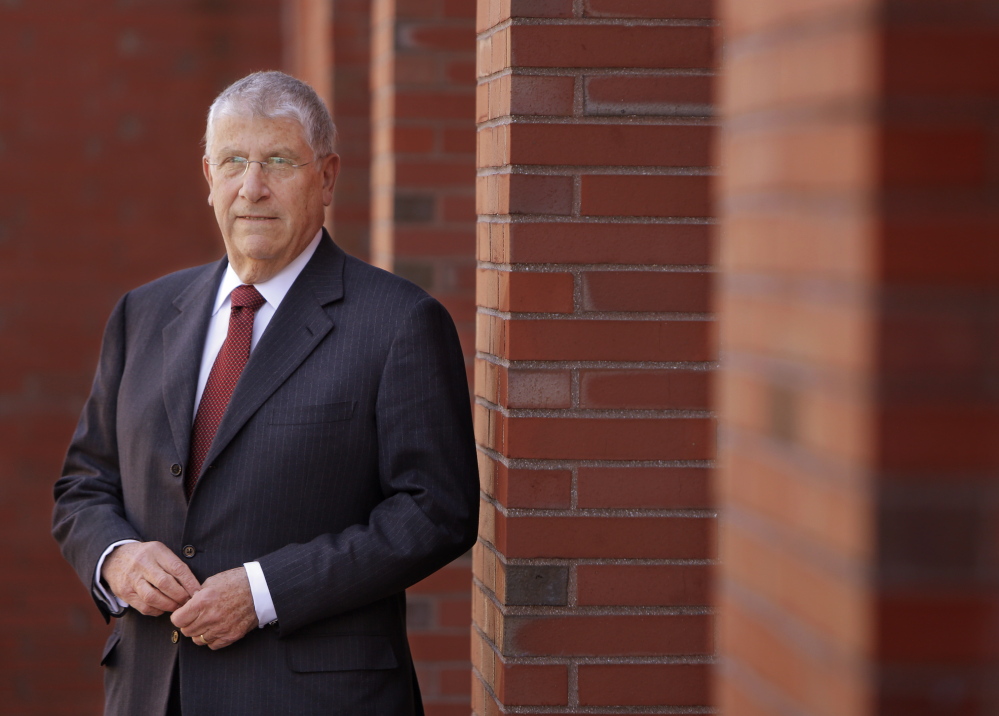BANGOR — A new graduate center expected to unify the University of Maine System’s business and law schools may eventually expand to include other graduate programs, but project leader Eliot Cutler is urging the system to use caution so that the planned center doesn’t grow too fast.
“I don’t want to blow it. I don’t want to see us taking on so much that we’re overloaded,” Cutler told the system’s trustees in a briefing Sunday, seven weeks after being hired to oversee development of the center, which would be based in Portland.
“There are a lot of other programs that fit neatly, frankly, in the center,” he said, adding that he personally would like to see the Muskie School of Public Service at the University of Southern Maine included immediately with the business and law schools. “But I’ve always felt strongly that you’ve got to crawl before you walk.”
Cutler, a lawyer and businessman who has run twice unsuccessfully for governor, was hired in late March for an 18-month assignment as chief executive officer of the graduate center initiative. He is charged with finishing the planning and program development process, building partnerships with Maine businesses and law firms, and present his proposal for the center to the trustees and the Harold Alfond Foundation in September 2016.
Chancellor James Page said Cutler’s final report must also make the business case for the center, and define how to measure its success.
“We have a very aggressive timetable,” he said of Cutler’s task.
Cutler said his initial assessment found that the center needs to reach four principal goals. It must be of sufficient size and variety to be academically distinctive, have a flexible curriculum that attracts students and meets market needs, have sufficient physical space and have sufficient funding.
“We don’t start with any of it,” Cutler said.
Cutler said he has spent most of the past seven weeks with people both on the campuses and in the legal and business communities building support and understanding about the center, and also laying the groundwork to attract future financial support.
The Harold Alfond Foundation provided $500,000 to pay for a market study on the center and an additional $1.25 million for its early-stage development r, which includes funding Cutler’s $195,000 annual salary.
The foundation’s board “has been very supportive so far,” Cutler said. “They have a deep interest in seeing this happen. It’s fair to say we anticipate and hope they will be the lead investor” in the center.
After his remarks, system officials made it clear the Harold Alfond Foundation has not made any future funding commitments.
Cutler said he has found broad support for the center in his recent conversations.
“I have been astonished as well as encouraged by the outpouring of support and enthusiasm from the legal and business community in the state,” he said.
Cutler said there was support from many faculty members, but also some “apprehension and uncertainty,” which he attributed to “rumors” about the center.
“I want to assure faculty that we need and welcome their serious engagement in the process,” he said.
He also announced that there would be two new pilot courses offered this fall using a combination of graduate program resources, something he has said would demonstrate the value and premise of combining and unifying different graduate programs. One, a course on negotiations, will involve the business schools at the University of Maine in Orono and at USM, as well as the University of Maine School of Law. Another, an environmental law course, will be taught by faculty from the USM business school, the law school and Muskie, along with guest lecturers, Cutler said.
Also Sunday, the board honored USM Acting President David Flanagan, who ends his tenure July 1 when new President Harvey Kesselman takes office.
In accepting a plaque, Flanagan said he was “bullish on USM” but acknowledged it had been a difficult year.
“The job you gave me was triage. (USM) was in financial free fall and my job was to stop that and reverse it. I think we’ve done that,” he said. “This has been, safe to say, the most difficult job I’ve had in my life. But it’s been very rewarding.”
The trustees meeting will continue on Monday, when the board is scheduled to vote on a $518 million budget for the fiscal year beginning in July. The budget includes cutting 206 positions systemwide and using $7 million from emergency reserves. Last year’s $529 million system budget required using $11.4 million in emergency funds and cutting 157 positions.
Copy the Story Link
Send questions/comments to the editors.




Success. Please wait for the page to reload. If the page does not reload within 5 seconds, please refresh the page.
Enter your email and password to access comments.
Hi, to comment on stories you must . This profile is in addition to your subscription and website login.
Already have a commenting profile? .
Invalid username/password.
Please check your email to confirm and complete your registration.
Only subscribers are eligible to post comments. Please subscribe or login first for digital access. Here’s why.
Use the form below to reset your password. When you've submitted your account email, we will send an email with a reset code.